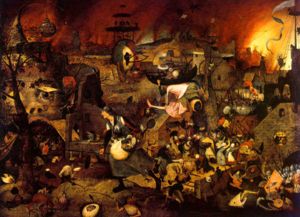
Dull Gret
Encyclopedia

Anglicisation
Anglicisation, or anglicization , is the process of converting verbal or written elements of any other language into a form that is more comprehensible to an English speaker, or, more generally, of altering something such that it becomes English in form or character.The term most often refers to...
version of Dulle Griet, a figure of Flemish
Flemish people
The Flemings or Flemish are the Dutch-speaking inhabitants of Belgium, where they are mostly found in the northern region of Flanders. They are one of two principal cultural-linguistic groups in Belgium, the other being the French-speaking Walloons...
folklore
Folklore
Folklore consists of legends, music, oral history, proverbs, jokes, popular beliefs, fairy tales and customs that are the traditions of a culture, subculture, or group. It is also the set of practices through which those expressive genres are shared. The study of folklore is sometimes called...
who is the subject of a 1562 painting
Painting
Painting is the practice of applying paint, pigment, color or other medium to a surface . The application of the medium is commonly applied to the base with a brush but other objects can be used. In art, the term painting describes both the act and the result of the action. However, painting is...
by Pieter Brueghel the Elder
Pieter Brueghel the Elder
Pieter Bruegel the Elder was a Flemish renaissance painter and printmaker known for his landscapes and peasant scenes . He is sometimes referred to as the "Peasant Bruegel" to distinguish him from other members of the Brueghel dynasty, but he is also the one generally meant when the context does...
. The painting depicts a peasant
Peasant
A peasant is an agricultural worker who generally tend to be poor and homeless-Etymology:The word is derived from 15th century French païsant meaning one from the pays, or countryside, ultimately from the Latin pagus, or outlying administrative district.- Position in society :Peasants typically...
woman, Mad Meg, who leads an army of women to pillage Hell
Hell
In many religious traditions, a hell is a place of suffering and punishment in the afterlife. Religions with a linear divine history often depict hells as endless. Religions with a cyclic history often depict a hell as an intermediary period between incarnations...
. The painting is in the Museum Mayer van den Bergh
Museum Mayer van den Bergh
Museum Mayer van den Bergh is a museum in Antwerp, Belgium. The collection once belonged to art collector Fritz Mayer van den Bergh...
in Antwerp.
She is also the subject of a 1640s painting by Flemish painter David Teniers the Younger
David Teniers the Younger
David Teniers the Younger was a Flemish artist born in Antwerp, the son of David Teniers the Elder. His son David Teniers III and his grandson David Teniers IV were also painters...
.
Dull Gret appears as a character in Caryl Churchill's Play "Top Girls
Top Girls
Top Girls is a 1982 play by Caryl Churchill. It is about a woman named Marlene, a career-driven woman who is employed at the 'Top Girls' employment agency. The play examines issues of gender discrimination present in the Thatcherite society that it is set in...
" (1982), where she recounts her invasion of Hell: "I'd had enough, I was mad, I hate the bastards. I come out my front door that morning and shout till my neighbors come out and I said, "Come on, we're going where the evil come from and pay the bastards out.'" (Churchill, 28).

